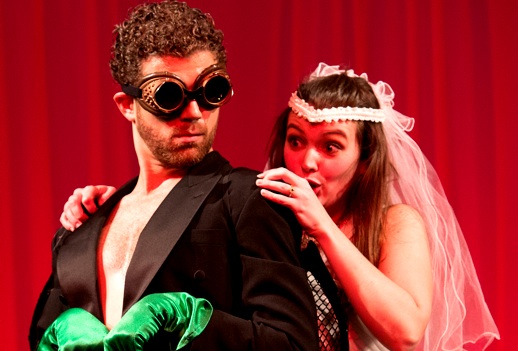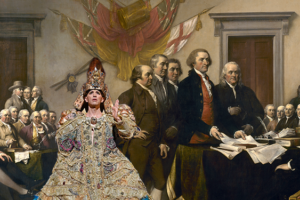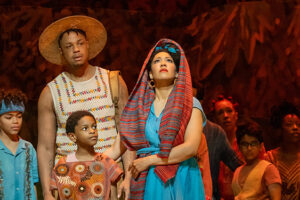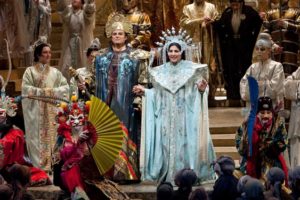

Offenbach’s show also sassed the power structure, Jupiter’s love affairs being a none too subtle jibe at Napoleon III. Today, a rewritten book might dissect the current marriage debate—if same-sex couples can marry, after all, what’s to keep them from mating with swans, bulls, laurels, anemones, showers of gold? Where will it all end?
There’s a lot of cute froth in this show, musically and otherwise, and it’s a pity it doesn’t come around more often. Hoffman aside, Offenbach’s tuneful concoctions are far too infrequent visitors, usually afterthoughts by companies devoted to Gilbert & Sullivan in search of something less familiar in the same line. That’s reasonable: G&S got together, initially, to create a more English, less risqué version of Offenbach’s Parisian triumphs.
If we had livelier, more couth translations, I think they’d be more popular here. The Met used to give La Périchole (in English) and NYCO will give it next month. NYCO did La Belle Hélène a few decades back, in a heavy, witless version. Philadelphia had a splendid translation of La Grande Duchesse and Stephanie Blythe, a very funny lady, batted it out of the park, but up here she has only done a semi-staged version, sung in French, dialect in English, a little like what Manhattan School gave us in Orphée.
New York has also seen Barbe-Bleu and La Vie Parisienne and Grande Duchesse by small companies, and a grab bag of the lesser bouffes. (He wrote them by the dozen.) They return, often welcome, but the migrations are irregular.
My only experience of Orphée in performance hitherto was an English staging on PBS many years ago. The translation was the sort to charm lovers of G&S:
Don’t assume an attitude
Of innocent beatitude,
For we know your latitude, libidinous Papa!
—that’s the gods on Olympus chaffing Jupiter. He has been trying to correct everybody’s morals but his own, keeping up appearances for the mortals you know. Political humor updatable to any era.
The score bubbles, with plangent couplets for sighing lovers or daring flirtations, and the orchestra parodies the effects of grandiose opera: When the story mounts to Olympus, ethereal music opens the curtains to reveal the rulers of the universe, fast asleep and, no doubt, hung over. When, in the last act, we remove to the Underworld, shrilling piccolos remind us of Weber’s Wolf’s Glen and Marschner’s Vampyr confronting the powers of Darkness.
Very elegant and very sly. The company’s orchestra, led by Jorge Parodi, after an initial clumsiness, played it quite professionally, sighing the sentimental tunes and with jaunty rhythms for the minuets and gallops. The concertmaster, Sven Stucke, was particularly charming as he “dubbed” whenever Orphée “struck up” his own instrument on stage.
The singers in Friday’s performance were college seniors. None, we were told, had been in a fully-staged, full-length theater piece before (aside from amateur efforts, surely), and none of them sounded quite ready to go pro, though some had potential in that direction. There was some cute, pert singing and some cute, pert performances and a few voices that may turn up in years to come. They did not require indulgence for an enjoyable performance: They were having fun and so did we.
Offenbach’s stylized characters thrive when cast with characters who already have an individual, farcical style; they could have used more of that, but it calls for some years performing to develop it. Stephen Biegner, who has a light, dry, ironic tenor, played Orphée as a prissy musician, credibly annoyed at the general lack of appreciation for his genius. Monica Danilov played Eurydice with amiable bitchery and she has a nice light voice but her coloratura is imprecise and casual.
Pluton/Aristée was Christopher Lilley, a funny fellow, whose elegant tenor rose (in his yodeling “shepherd” song) to a robust, room-filling alto of exceptional color. Tyler Schoen, tall and bearded as befits a Jupiter but in tails and green goggles when disguised as a “fly,” made the most of his buzzing seduction of Eurydice. He is also to be commended for snarling a line or two without losing rhythm or melody.
Kendra David Dodd sang a Cupid that implied Cherubinos in her future, and Megan Samarin and Erin McGlover were charming as Venus and Minerva, but Tamara Rusqué, as Diana, had the most impressive voice (if with some melodramatic mugging), a soprano as loud as the rest of the cast put together. If she perfects her control, she’ll be a valkyrie before she’s thirty.
Alexander Chen’s John Styx was a puzzle, genuinely funny but his command of English rather fighting the effect. Noragh Devlin played a bullying Public Opinion in the manner of a Katisha.
The dance routines were basic (those can-cans!), but the singers were all rather more skilled at such steps than opera singers of a previous generation had to be. That skill will come in handy nowadays.
Photo by Brian Hatton.























Comments